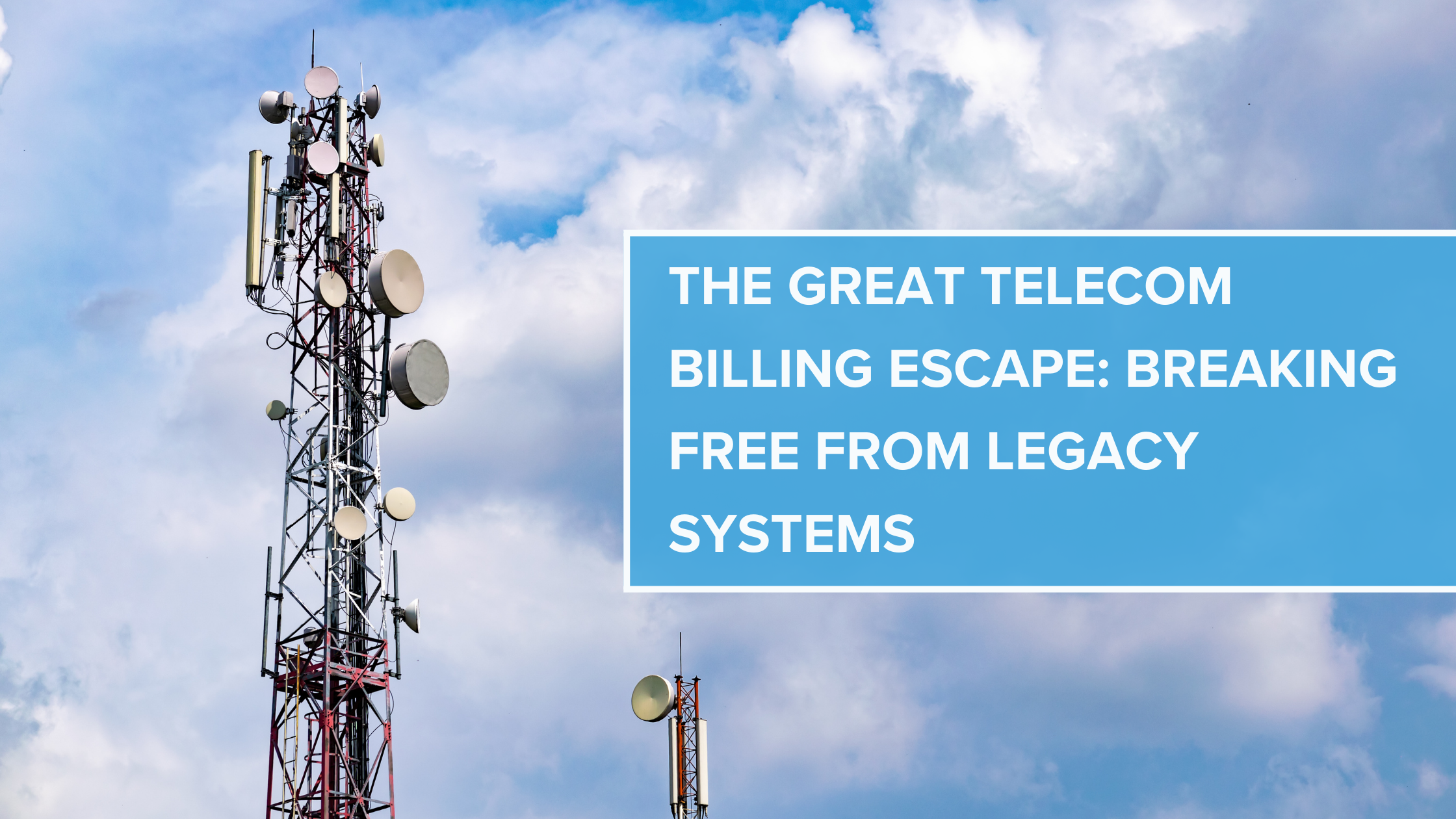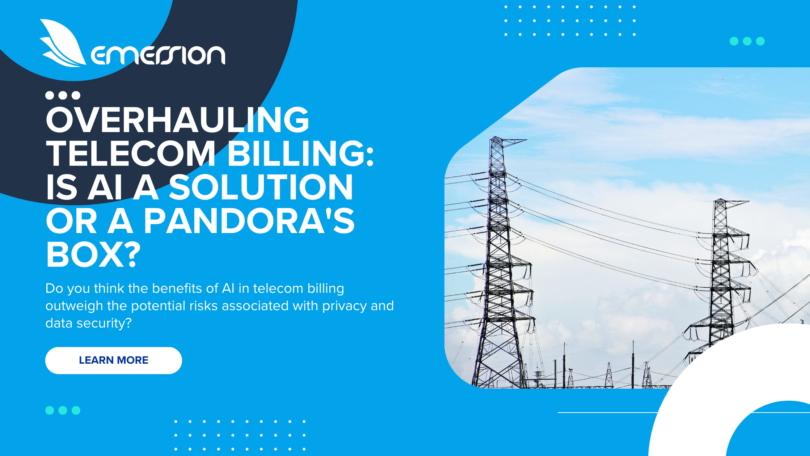The Great Telecom Billing Escape: Breaking Free from Legacy Systems
Introduction:
In the fast-evolving world of telecommunications, clinging to outdated billing systems is no longer an option. Legacy billing systems are inflexible, inefficient, and incapable of handling the demands of modern services like 5G, IoT, and usage-based pricing. Migrating to a modern billing solution is crucial for telcos looking to stay competitive, but the transition can seem daunting. Breaking free from legacy systems requires careful planning, integration, and support. Emersion’s billing platform is designed to simplify this migration process, offering seamless integration and robust migration support to help telecom providers make the switch with confidence.
The Pain Points of Legacy Telecom Billing Systems
Legacy billing systems were built for a time when telecom services were simpler—mainly focused on fixed subscription models for voice and text services. Today, the landscape has changed dramatically. With the rise of data-centric services, 5G, and the Internet of Things, telecom providers need more flexible, scalable billing systems. However, many telcos are still relying on outdated systems that no longer meet their needs. Here are some of the key challenges of using legacy billing systems:
1. Lack of Flexibility for Modern Services
Legacy billing systems are designed for a time when telecom services were primarily voice-based. These systems struggle to handle the complexities of modern telecom offerings, such as dynamic pricing, real-time usage tracking, and multi-service bundles. This lack of flexibility limits a telco’s ability to introduce new services or offer personalised plans.
2. High Maintenance Costs
Maintaining legacy systems is expensive and time-consuming. These outdated systems often require constant updates, patches, and workarounds just to stay functional. As these systems age, the cost of maintenance continues to rise, diverting resources away from innovation and service improvements.
3. Inability to Scale
With the explosion of data-driven services and connected devices, telecom providers need systems that can scale rapidly. Legacy billing systems often struggle to handle increasing volumes of transactions and the complexity of services, leading to operational bottlenecks and inefficiencies.
4. Poor Integration with Modern Technologies
As telecom providers introduce new technologies like cloud-based services and 5G, legacy systems lack the integration capabilities to connect seamlessly with these platforms. This results in data silos, delayed billing, and a disjointed customer experience.
Why Migration to Modern Billing Systems is Essential
Moving away from legacy billing systems is not just a matter of convenience—it’s a strategic necessity. Modern billing systems are designed to handle the demands of today’s telecom services, offering flexibility, scalability, and real-time capabilities that legacy systems simply can’t match. Here’s why migration is essential:
1. Flexibility for 5G and IoT Services
5G and IoT are revolutionising the telecom industry, enabling new services like smart cities, autonomous vehicles, and industrial IoT applications. Modern billing systems are built to support flexible pricing models for these services, allowing telcos to offer dynamic pricing, real-time usage tracking, and custom billing for enterprise customers.
2. Real-Time Billing and Usage Tracking
Modern telecom customers expect real-time visibility into their usage. Legacy systems struggle to provide this level of transparency. By migrating to a modern billing system, telcos can offer real-time billing, ensuring that customers are billed accurately and transparently for the services they consume.
3. Improved Customer Experience
Today’s telecom customers expect personalised, flexible service plans that match their usage patterns. Modern billing systems enable telcos to offer tailored packages, dynamic pricing, and seamless service upgrades, improving the overall customer experience and driving customer retention.
4. Scalability for Future Growth
Modern billing systems are designed to scale with your business. As telcos expand their service offerings and customer base, a flexible billing platform ensures that they can handle growing volumes of transactions, new services, and cross-border billing with ease.
The Challenges of Migrating from Legacy Systems
While the benefits of migrating to a modern billing platform are clear, the process itself can be challenging. Migrating from a legacy system involves integrating new technologies, transferring customer data, and ensuring business continuity throughout the process. Here are some of the common challenges telcos face when migrating:
1. Data Migration Complexity
One of the biggest challenges in migrating from a legacy system is transferring customer data to a new platform. Customer records, billing history, and service agreements must be moved accurately to avoid disruption. This requires careful data migration planning and testing to ensure that no data is lost or corrupted during the transition.
2. Integration with Existing Systems
Legacy systems often have complex integrations with other business systems, such as CRM platforms, accounting software, and network management tools. Migrating to a modern billing system requires these integrations to be rebuilt or replaced, ensuring that all systems work together seamlessly.
3. Minimising Downtime and Disruption
For telecom providers, any disruption to billing processes can result in delayed payments, customer dissatisfaction, and lost revenue. Minimising downtime during the migration is critical to maintaining business continuity. This requires a phased migration approach and thorough testing before going live with the new system.
How Emersion Makes Migration Seamless
Emersion’s billing platform is designed to simplify the migration process, offering telecom providers a smooth transition from legacy systems to modern, flexible billing solutions. With a focus on seamless integration and migration support, Emersion helps telcos break free from outdated systems with minimal disruption. Here’s how Emersion supports telecom providers through the migration process:
1. Seamless Integration with Legacy Systems
Emersion’s platform is built to integrate with existing systems, ensuring that telecom providers can transition without disrupting their operations. Whether you’re working with CRM, accounting, or network management tools, Emersion’s flexible APIs make integration seamless, allowing data to flow between systems smoothly.
2. Comprehensive Data Migration Support
Emersion offers full data migration support, ensuring that customer records, billing history, and service agreements are transferred accurately and securely. Our team works closely with your IT staff to plan and execute the migration, conducting thorough testing to ensure data integrity before going live.
3. Phased Migration to Minimise Disruption
Emersion understands the importance of business continuity during the migration process. That’s why we recommend a phased migration approach, allowing telecom providers to migrate their billing processes in stages, minimising downtime and ensuring a smooth transition for customers.
4. Scalable, Future-Ready Platform
With Emersion, telecom providers gain access to a scalable, future-ready billing platform that can grow with their business. Whether you’re introducing new 5G services, expanding into IoT, or entering new markets, Emersion’s platform is designed to support your growth and ensure that your billing processes remain flexible and reliable.
What It Means for Your Business
- Increased Flexibility: Emersion’s platform allows telcos to introduce new services, offer dynamic pricing, and scale their operations with ease.
- Improved Customer Experience: By migrating to a modern billing system, telecom providers can offer real-time billing, personalised plans, and greater transparency for customers.
- Reduced Maintenance Costs: Emersion’s modern platform reduces the high maintenance costs associated with legacy systems, freeing up resources for innovation.
- Scalable for Future Growth: With Emersion, telecom providers can scale their billing operations as they introduce new services, expand into new markets, and grow their customer base.
- Seamless Integration and Migration: Emersion’s migration support ensures that telecom providers can transition to a modern billing system without disruption, maintaining business continuity throughout the process.
Real-World Example: Telecom Provider Migration
A leading telecom provider migrated from a legacy billing system to Emersion’s modern platform to support their growing 5G and IoT services. Emersion provided seamless integration with their existing CRM and network management tools, along with comprehensive data migration support. By adopting a phased migration approach, the provider experienced minimal disruption, and within months, they were able to introduce flexible, real-time billing for their new services. This migration reduced their billing maintenance costs by 25% and improved customer satisfaction through more transparent billing practices.
Call-to-Action
Is your telecom business ready to break free from legacy billing systems? Emersion’s seamless integration capabilities and comprehensive migration support can help you transition to a modern billing solution that meets the demands of today’s telecom industry. Contact us today to learn how Emersion can support your migration journey and future-proof your billing infrastructure.
Questions for Reflection
- What limitations are you facing with your current legacy billing system?
- How would real-time billing and flexible pricing models benefit your customers and your business?
- Are you prepared to scale your billing operations as you introduce 5G and IoT services?
- Could migrating to a modern billing platform help reduce your maintenance costs and free up resources for innovation?
- What steps are you taking to ensure a smooth migration from your legacy billing system?
Learn more about Emersion’s billing solutions and how they can help your business break free from legacy systems and embrace the future of telecom billing.


